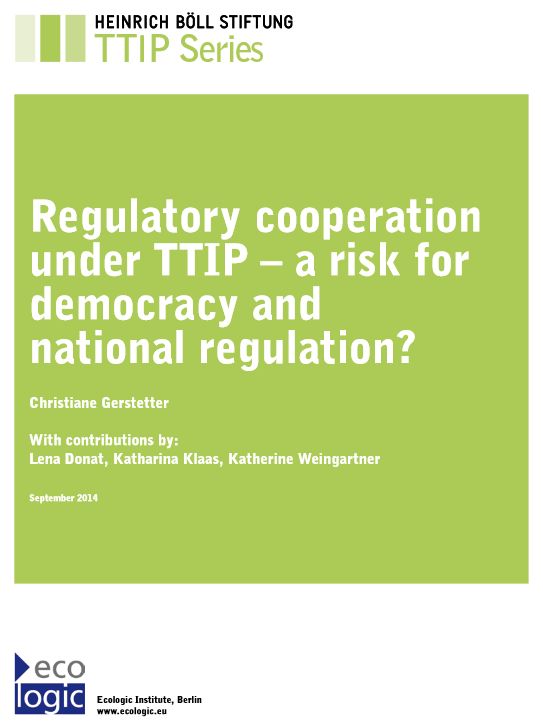Regulatory Cooperation in TTIP – Observations (also) from an Environmental Viewpoint
- Presentation
- Date
-
- Location
- Berlin, Germany
- Panel discussion
-
Dr. Christiane Gerstetter
Christiane Gerstetter, Senior Fellow at Ecologic Institute, participated on 8 October 2014 in a panel discussion with the title: "Gestatten, TTIP! Regulatorische Zusammenarbeit - Innovatives und notwendiges Instrument oder Gefahr für Schutzstandards und Demokratie? Daten, Fakten, Hintergründe" (TTIP! Regulatory cooperation - innovative and necessary instrument or threat for protection standards and democracy? Data, facts,background) at the mission of the German state of Baden-Württemberg in Berlin. She presented among other things the results of a study on regulatory cooperation in the context of the planned Transatlantic Trade and Investment Partnership (TTIP). The presentation is available for download.
In her contribution entitled "Regulatory cooperation in TTIP – observations (also) from an environmental viewpoint", Christiane Gerstetter provided an overview of existing mechanisms for regulatory cooperation. These include for example requirements of notification, information exchange, mutual recognition of inspection procedures and the harmonization of legal rules. She pointed out that regulatory cooperation is carried out mainly by the executive, for example regulatory agencies. Taking EU regulation on recognition of organic products as an example, she explained the implementation of results of international cooperation into the EU legal system.
Regulatory cooperation under TTIP - conclusions
Subsequently, Christiane Gerstetter presented to the ca. 70 participants three essential conclusions of the study on "Regulatory harmonization under TTIP – a risk for democracy and national regulation?", which was conducted in cooperation with the Heinrich Böll Foundation.
- Regulatory cooperation between the US and the EU can also take place outside of a comprehensive TTIP; TTIP is not needed for this purpose. There are many multilateral fora in which the US and the EU could intensify their cooperation. Also the example of the US-Canada "Regulatory Cooperation Council" shows that regulatory cooperation can be successful outside of a legally binding international agreement.
- It is not to be expected that agreements about regulatory cooperation will formally change legislative processes at the national and EU level. In both EU and Germany, there are constitutional rules on what can be delegated to the executive, and these rules determine the scope for the implementation of results of regulatory cooperation by for example the European Commission. Far-reaching political questions have to be regulated in the normal legislative process.
- There is, however, the risk that increased regulatory cooperation in the context of TTIP, and the establishment of bodies for that, could lead to the strengthening of trade interests in the political discourse. This is critical from an environmental perspective. Reasons for concern are proposal that the respective other side should be able to comment on legislative plans very early in the legislative process, and the idea that impact assessments for legislative proposals should consider more than before the impacts on international trade. Also the participation of the civil society in regulatory cooperation is unclear so far. Moreover, from a democratic perspective, there is a risk in further strengthening the executive within the political process of the EU.
Gerstetter emphasized also that the impacts of regulatory cooperation depend on what exactly is agreed upon and how the respective agreement is implemented. So far, only few position papers of the EU Commission are publicly known on the topic.
Further panelists were Lutz Güllner (Unit “Information, Communication and Civil Society”, DG Trade, European Comission), Ernst-Christoph Stolper (BUND – Friends of the Earth Germany) and Stormy-Annika Mildner (BDI – Federation of German Industries).
The event was moderated by Volker Ratzmann (Chief of staff of the mission of Baden-Württemberg) and Christian Thorun (Head of the Institute for Consumer Policy – ConPolicy).





